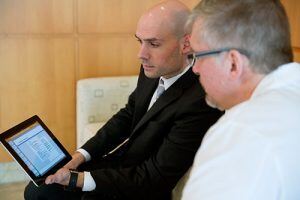Early Feasibility Studies
Clinical Trials
The EFS (Early Feasibility Study) process is a regulatory pathway created by FDA to facilitate the study of novel medical devices in a U.S. clinical setting. Unlike large confirmatory studies, early feasibility studies are meant to evaluate the device with a small number of patients (usually less than 10) to examine unanswered questions about the device design and use. Most often these are performance questions that cannot be answered by testing on the bench or in animal models; clinical use in humans is needed to confirm viability of the design.
Early feasibility studies engender more risk than confirmatory studies because of their earlier place in the development process. In particular, they can serve to develop and assess user skills (e.g., deployment techniques), as much as testing the performance of the device itself. Device use in this early clinical setting may reveal opportunities for altering the device design or refining techniques for use prior to starting a larger trial.
 Close collaboration between physician investigators and study scientists is required for all clinical studies, but the EFS emphasis on user technique and device performance makes it critically important in that setting. Accordingly, success in an EFS requires selecting investigators with characteristics that facilitate this essential process. MED Institute understands what it takes to succeed, and can help in this important part of the process.
Close collaboration between physician investigators and study scientists is required for all clinical studies, but the EFS emphasis on user technique and device performance makes it critically important in that setting. Accordingly, success in an EFS requires selecting investigators with characteristics that facilitate this essential process. MED Institute understands what it takes to succeed, and can help in this important part of the process.
Likewise, the patients invited to participate in the EFS must have a risk tolerance commensurate with the early clinical experience setting, where the device or study regimen may change and additional information and feedback are requested throughout the study, especially if the patient is the device end-user. MED Institute has expertise in writing study inclusion/exclusion criteria that target the right patient population for a study’s unique needs.
Finally, the study must be managed in a way that facilitates rapid refinements of the device design, use, and techniques. The study protocol should be written with flexibility built in to allow these elements to be adjusted throughout the study, as results are obtained. MED Institute has 30 years of experience executing successful device clinical studies, ranging from EFS to global pivotal trials that led to device approvals.
Contact the Clinical Research team at MED Institute for more information about writing flexible study protocols suitable for EFS, navigating the EFS pathway with FDA, and conducting a study that allows feedback to flow amongst the stakeholders so your novel device may be clinically tested in the most efficient way.
For more information about MED Institute and how we can partner with you, please visit medinstitute.com or contact us directly at askmed@medinstitute.com | 855.463.1633.
Get email about news, services, and events from MED Institute.
OUR COMMITMENT
We are committed to consistently performing services with high quality, that deliver exceptional results, and add value to the client’s business.
For client surveys sent in 2024, we received ratings of 4.98/5 points (13).

